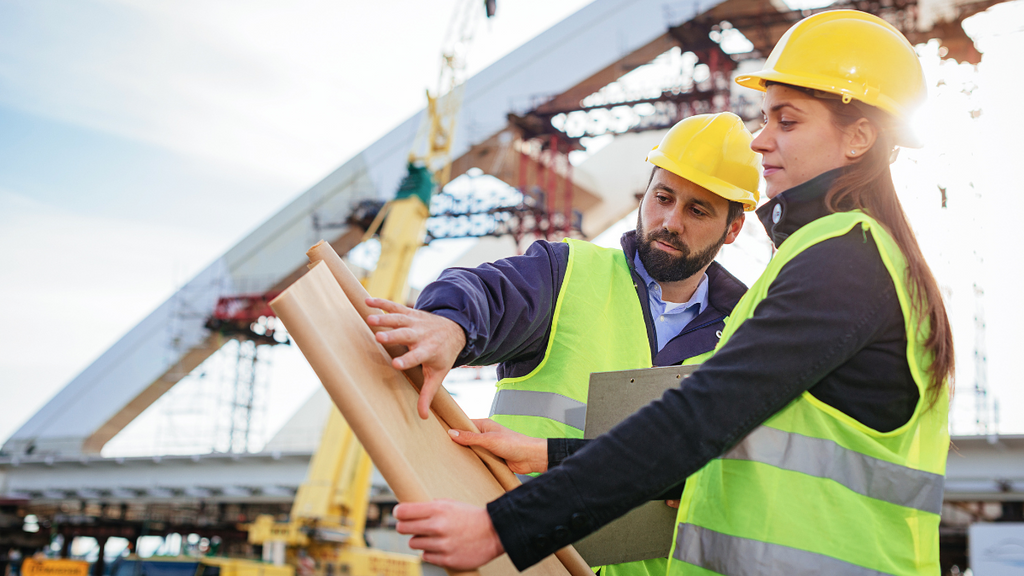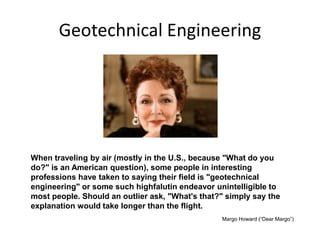Some Known Details About Geotheta
Some Known Details About Geotheta
Blog Article
The smart Trick of Geotheta That Nobody is Discussing
Table of ContentsThe 9-Minute Rule for GeothetaThe Single Strategy To Use For GeothetaThe 2-Minute Rule for GeothetaGeotheta Things To Know Before You BuyMore About Geotheta

They conduct website investigations, collect examples, do lab examinations, and assess data to evaluate the suitability of the ground for building tasks - Consulting Engineers. Based on their searchings for, geotechnical designers supply recommendations for foundation design, incline stability, maintaining frameworks, and reduction of geotechnical hazards. They collaborate with other experts, such as architects, structural designers, and building groups, to make certain that geotechnical factors to consider are incorporated right into the overall job design and implementation
By examining the actions and properties of soil and rock, they can identify prospective geotechnical hazards such as landslides, soil negotiation, or incline instability. Their experience assists prevent failures or mishaps that can jeopardize lives and residential or commercial property. Here are some comprehensive tasks and duties of a geotechnical designer: Website Examination: Geotechnical engineers conduct site examinations to collect data on subsurface conditions.
They translate the data to understand the residential or commercial properties and behavior of the dirt and rock, including their stamina, permeability, compaction characteristics, and groundwater problems. Geotechnical Evaluation and Design: Geotechnical engineers analyze the data gathered during website examinations to evaluate the security and viability of the site for building and construction projects. They carry out geotechnical computations and modeling to assess elements such as birthing capability, negotiation, incline security, side planet stress, and groundwater circulation.
The Buzz on Geotheta
Foundation Design: Geotechnical engineers play a vital role in designing structures that can safely support the designated framework. They examine the dirt problems and load needs to determine the ideal foundation type, such as superficial foundations (e.g., footings), deep foundations (e.g (https://geotheta.carrd.co/)., piles), or specialized methods like soil enhancement. They consider variables such as settlement restrictions, bearing capability, and soil-structure interaction to develop optimal foundation layouts
They evaluate building and construction strategies, display website tasks, and perform area examinations to verify that the style suggestions are adhered to. If unexpected geotechnical problems develop, they analyze the situation and offer referrals for remediation or adjustments to the style. Threat Evaluation and Mitigation: Geotechnical designers evaluate geotechnical risks and risks connected with the task website, such as landslides, liquefaction, or dirt erosion.

Cooperation and Interaction: Geotechnical designers work carefully with other professionals entailed in a task, such as architects, architectural engineers, and building groups. Efficient interaction and cooperation are important to incorporate geotechnical considerations into the overall project layout and building and construction procedure. Geotechnical engineers supply technical knowledge, solution questions, and make certain that geotechnical needs are met.
The Ultimate Guide To Geotheta
Below are some types of geotechnical designers: Foundation Designer: Structure designers specialize in creating and examining foundations for frameworks. They assess the soil conditions, load requirements, and site attributes to determine one of the most proper structure kind and style, such as shallow foundations, deep foundations, or specialized techniques like stack structures.
They assess the aspects affecting slope security, such as dirt residential properties, groundwater problems, and slope geometry, and establish approaches to protect against incline failings and mitigate threats. Quake Designer: Earthquake engineers focus on evaluating and designing frameworks to hold up against seismic pressures. They evaluate the seismic risk of a site, evaluate dirt liquefaction capacity, and develop seismic layout standards to ensure the safety and strength of structures throughout earthquakes.
They execute field screening, accumulate examples, and examine the gathered information to identify the dirt buildings, geologic formations, and groundwater conditions at a website. Geotechnical Instrumentation Engineer: Geotechnical instrumentation engineers concentrate on surveillance and determining the behavior of soil, rock, and frameworks. They set up and keep instrumentation systems that keep track of factors such as dirt negotiation, groundwater levels, incline activities, and structural variations to evaluate efficiency and provide very early cautions of potential problems.
The Facts About Geotheta Revealed
They perform examinations such as triaxial tests, consolidation tests, direct shear examinations, and leaks in the structure examinations to gather information for geotechnical analysis and design. Geosynthetics Designer: Geosynthetics designers specialize in the design and application of geosynthetic products, such as geotextiles, geogrids, and geomembranes. They utilize these products to boost soil stability, strengthen slopes, provide drain options, and control disintegration.
They have a tendency to be investigatory people, which indicates they're intellectual, reflective, and inquisitive. They wonder, methodical, reasonable, logical, and rational. Several of them are additionally social, indicating they're kind, generous, cooperative, individual, caring, practical, understanding, sensible, and pleasant. Does this seem like you? Take our complimentary profession test to discover if geotechnical designer is just one of your leading occupation suits.
In the office environment, geotechnical designers make use of specialized software program devices to carry out computations, produce layouts, and assess information. They prepare reports, review project requirements, interact with customers and employee, and coordinate task activities. The office setup offers a conducive atmosphere for research, evaluation, and collaboration with various other specialists associated with the job.
The Single Strategy To Use For Geotheta
They frequently check out task sites to carry out website examinations, assess geotechnical problems, and gather information for evaluation. These gos to involve traveling to various locations, often in remote or tough terrains. Geotechnical engineers might carry out soil sampling, conduct examinations, and Source screen building and construction activities to guarantee that the geotechnical facets of the task are being implemented properly.
Geotechnical engineers additionally function in specialized geotechnical research laboratories. Geotechnical research laboratory designers function thoroughly in these settings, taking care of screening tools, running tools, and taping data.
Report this page